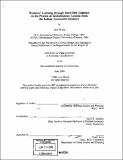Workers' learning through inter-firm linkages in the process of globalization : lessons from the Indian automobile industry
Author(s)
Okada, Aya, 1966-
DownloadFull printable version (19.57Mb)
Other Contributors
Massachusetts Institute of Technology. Dept. of Urban Studies and Planning.
Advisor
Alice H. Amsden.
Terms of use
Metadata
Show full item recordAbstract
This dissertation examines the conditions under which firms foster the development of their workers' skills in the process of globalization, using a case study of the automobile industry in India based on extensive fieldwork in India in 1996, 1997 and 1998. As India underwent economic reforms over the past decade, the Indian automobile industry has experienced remarkable growth and dynamic transformations, with an increased inflow of foreign direct investment (FDI) and intensifying competition within the domestic market, leading to considerable restructuring. In this process, two leading vehicle manufacturers, one with FDI, and the other without it, have played key roles in promoting growth in production and export, while increasing their competitiveness, through their massive investment in skill development for their workers. Indeed, both firms have well-structured internal incentive mechanisms to encourage and reward workers' learning. They have also strengthened their backward linkages by institutionalizing various learning mechanisms through their supply chains, altering the model of supplier relations that had prevailed in India. My questionnaire survey of 50 component suppliers revealed that the nature of skills has recently changed with increased emphasis on behavioral traits, resulting in considerable upskilling, particularly among workers at component suppliers. These findings markedly contrasts with the experiences elsewhere documented in the literature, where few FDI-affiliated firms develop backward linkages, and where local firms weaken comparatively in the face of growing dominance by FDI. Challenging the growing literature that suggests FDI plays a role in brining new knowledge and skills to developing countries, this study finds that even in the process of globalization, the interplay of various institutional forces both inside and outside the firms still crucially shape the patterns of in-firm skill development. Such institutional forces include: 1) the peculiar historical imperatives under which firms needed to operate and develop their technological capabilities; 2) national institutional frameworks; 3) the government's involvement; 4) institutional alliances between firms and training institutions; and 5) vertical inter-firm linkages. In particular, inter-firm linkages are critical in promoting skill development among smaller local suppliers, thus spreading workers' learning widely across the economy. The Indian government has played an important role in 1) developing a key firm that would lead the growth of the industry, set operational and performance standards, and serve as a catalyst for the industry-wide learning; 2) forcing that firm to develop backward linkages through various policy measures; and 3) creating mechanisms for firms to promote in-firm training through policies such as statutory apprenticeship schemes. Thus, contrary to the claim by human capital theorists, various institutional conditions created rather than reduced incentives for firms to promote in-firm training not only for their own workers but also for workers at their suppliers.
Description
Thesis (Ph.D.)--Massachusetts Institute of Technology, Dept. of Urban Studies and Planning, 2000. Includes bibliographical references (leaves 246-252).
Date issued
2000Department
Massachusetts Institute of Technology. Department of Urban Studies and PlanningPublisher
Massachusetts Institute of Technology
Keywords
Urban Studies and Planning.